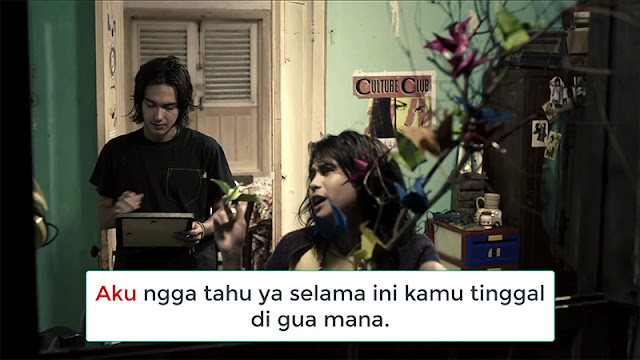- Get link
- X
- Other Apps
Posted by
Iman Prabawa
on
- Get link
- X
- Other Apps
Halo, semuanya? Apa kabar? This time, we are going to talk about the meaning of [aku] in Indonesian. As always, we are also going to be watching examples from movies, YouTube videos, and whatnot where Indonesians use this word.
If you are a beginner in the Indonesian language, you can learn step by step with My Lesson Here.
Okay, without further ado, let's jump right in.
Aku In Bahasa Indonesia
[Aku] is informal for [saya] = I. You will hear [aku] used in informal settings, like in daily conversations. You use [aku] with [kamu], whereas [kamu] is informal for [Anda] = you.
When Do You Use Aku?
If you're close enough to someone, you can use this word. But if you're new with that person, I think it's safer if you're using [saya] instead of [aku]. If you feel that you're close enough to that person, you can switch from [saya] to [aku], as simple as that.
In Jakarta, another informal word that is used a lot is [gue]. It is more common to use [gue] than to use [aku] in Jakarta. In fact, from what I've seen in my daily life in Jakarta, [aku] is used by women a lot more than by men. But only in Jakarta.
Men in Jakarta usually use the word [gue] instead of [aku] for the informal word [saya]. But, once again, it's only in Jakarta. Outside of Jakarta, [aku] is used by men and women as the informal word [saya] in daily conversation.
Also, you will hear couples using the words [aku] and [kamu] when talking to each other. If they're not a couple, they usually use [gue] and [loe]. This happens in Jakarta and its surrounding cities like Depok, Tangerang, Bekasi, and Bogor.
How to Pronounce Aku
Here is how you pronounce [aku] in bahasa Indonesia.
Next, let's watch clips where the word [aku] is spoken by Indonesians.
Examples of Aku In-Use
The first clip we are about to watch is taken from Perahu Kertas 1 (2012). Let's watch the clip below.
In this scene, they are friends, so they use the informal words [aku] and [kamu] to speak to each other.
You can watch all the clips on my Buy Me a Coffee post without the black screen. I also provided the captions in Indonesian with English translations and vocabulary explanations so you could better understand what happens in the clip. I explain this on my About Me page.
The second clip is taken from a movie on BRI's YouTube channel called Pakai Hati, Season 2, Episode 1 (2020). Let's watch the clip below.
In this clip, Indah uses the word [aku] when speaking to Bagas. She says this:
Makanya aku apal banget tentang industry kayu.
Which can be translated into English as:
That's why I know a lot about the wood industry.
But first, before she begins to use the word [aku], she uses the word [saya] instead of [aku].
You can watch all the clips on my Buy Me a Coffee post without the black screen. I also provided the captions in Indonesian with English translations and vocabulary explanations so you could better understand what happens in the clip. I explain this on my About Me page.
The third clip is taken from a movie on Airwalk Indonesia's YouTube channel - Airwalk Indonesia Web Series, Episode 1 (2019). Let's watch the clip below.
In this clip, Dira uses [aku], while Adinata uses [gua] instead of [aku].
You can watch all the clips on my Buy Me a Coffee post without the black screen. I also provided the captions in Indonesian with English translations and vocabulary explanations so you could understand them better. You can also download all the clips there. I explain this on my About Me page.
Read also: Halu Meaning In Indonesian
That's gonna be it for today's article. If I find another example, Insha Allah, I will update this article again. Thank you so much for reading this article, and I'll see you soon.
- Get link
- X
- Other Apps
Hello, I'm Iman Prabawa a.k.a Pak Guru Iman. I love to share about languages. My Instagram, @iman_prabawa

Comments
Post a Comment